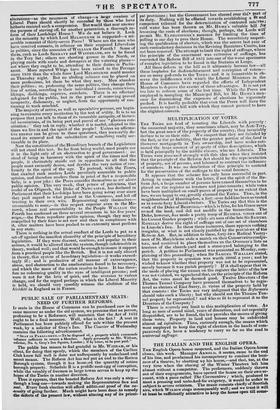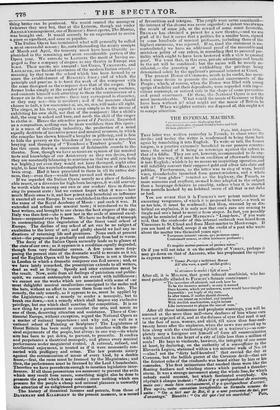THE ITALIAN AND THE ENGLISH OPERA.
THE English Opera-house reopened, and the Italian Opera-house closes, this week. Manager ARNOLD, it seems, came to the end of his line, and proclaimed his incompetency to conduct the busi- ness of a theatre, by shutting up his house,—and that, too, at the very time when the closing of the Winter Theatres left him almost without a competitor. The performers, suddenly thrown out of their engagements, have opened the house on their own ac- count, with a piece called The Covenanters ; which, produced to meet a pressing and unlooked-for exigency, it would be unfair to subject to severe criticism. The music consists chiefly of Scottish airs, which Wiesow sings incomparably well ; and we trust it will at least be sufficiently attractive to keep the house open till some-
thing better can be produced. We would remind the managers (whoever they may be), that at the Lyceum, though not under
ARNOLD'S management, one of Bisnoe's finest operas, The Monroe, was brought out. It would scarcely be an experiment to revive a piece so eacellent, and once so popular.
The Italian Opera has terminated what will generally be called a most successful season ; for, notwithstanding the scanty receipts of March and April, the treasury must have been liberally re- plenished in the remaining and more considerable portion of the Opera year. We concede to LAPORTE the merit of having en- gaged as fine a company of singers as any theatre in Europe can beast. Their merits are unequal : but Geis', TAMBURINI, and LARLACHE, are finished specimens of the modern 'Italian school,— meaning by that term the school which has been formed by or since the establishment of Rossisi's fame; and of which the principle and practice is to treat the work of the composer with the same disregard as the composer (Ices that of the singer. The former looks simply at the number of feet which a song contains, and contents himself with attaching to them the reminiscence of a former air in the same metre : these may correspond in character, or they may not—this is accident ; nod if the measure should
chance to halt, a few convenient si, sis, no, nos, will make all right. The singer, in his turn, regards a song simply as to the means of
exhibiting his own skill, not that of the composer: like a child's
doll, the song is naked and bare, and needs the skill of the singer to clothe it. Hence the attractive power of I Puritani. Regarded
as a composition, nothing can be more worthless than this opera : it is a mass of drivelling imbecility, the production of a mind equally destitute of inventive power and musical resource, in which the compiler has shown himself a bungler in pilfering, and is fain to bide the poverty or the blunders of his score under a ceaseless braying and thumping of " Tromboni e Tamburi grande." Yet has this opera drawn a succession of fashionable crowds to the theatre. Now, though we have as mean an opinion of the musical taste and knowledge of our Aristocracy as they can desire, (and they are constantly labouring to convince us that we still rate both tco highly,) yet even they would not have thronged, night after night, to hear this wretched compilation, had the music of BELLINI been sung. Had it been presented to them in all its native dul- ness, they—even they—would have yawned and dozed. If we regarded the Italian Opera merely as a place of fashion- • able resort, or a diversion for high-born loungers, it would seemly be worth while to occupy our own or our readers' time in discus- sing its present state: but we cannot forget what it was— how much Music owes to it, and how potent and beneficial an influence it exerted all over Europe. It was established in this country under the name of the Royal Academy of Music : and such it was. It extended and refined our musical taste ; it introduced us to the best writers, and brought to our shores the best singers of the age. Italy was then first—she is now last in the scale of musical excel- lence—surpassed even by France. We have no feeling of triumph - in contemplating this degradation of the finest vocal school of Europe. The decline of any school of art- can be no subject of exultation to the lover of art; and gladly should we bail any in- dications of returning life and greatness. None such.at present exist—the progression is gradually and steadily from bad to worse. The decay of the Italian Opera naturally leads us to glance at • the state of our own; as it appears in a condition equally degraded, though from very dissimilar causes. A few years more (sup- posing the present state of the dramatic world to remain as it is), and the English Opera will be forgotten. There is not a theatre in London to which a dramatic composer can find access; and, as we have lately remarked, the proscription extends to all writers, dead as well as living. Speedy and utter extinction must be the result. Now, aside from all feelings of patriotism and public- spirit, we cannot contemplate such an event with indifference; we cannot see the works which are associated with some of cur most delightful musical recollections consigned to the moles and the bats, without an effort to rescue them from such a fate. The remedy, the only remedy, as it appears to us, must be applied by the Legislature,—not a remedy to confer a monopoly, but to break one down,—not a remedy which shall impose any exclusive privilege, but one which shall sanction fair competition. It is no new thing for a government to consider the arts, and music as one of them, deserving attention and assistance. Those of Con- tinental Europe, without exception, regard the National Opera as a matter of national importance : and why not, as well as a national school of Painting or Sculpture ? The Legislature of Great Britain has been ready enough to interfere with the mu- sical enjoyments of the people, but always in one way—its whole aim has been to put down, to prevent, to proscribe. It confers and perpetuates a theatrical monopoly, and places every musical performance under magisterial control. A rational, refined, and intellectual enjoyment, is treated as if it were necessarily con- nected with profligacy and crime. The law protects society against the contamination of music of every kind, by a double fence,—first, the room must be licensed by the Magistrates; and then, the performance must be licensed by the Lord Chamberlain. Therefore we have precedents enough to sanction legislative inter- ference. If all these precautions are necessary to prevent the evils which may result from music, something might also be done to promote the good which it may confer ; since nothing which can procure for the people a cheap and rational pleasure is unworthy the attention of an enlightened government.
The history of theatrical licences and patents, from those of -D&VENANT and KILLEGREW to the present moment, is a record of favouritism and intrigue. The people were never considered— the interest of the drama was never regarded : a patent was always the result of some job, or the reward of some court favourite. BRARAM has obtained a patent for a new theatre,—and we are glad of it : but it seems that a petition for a similar boon, signed by some hundreds of musical professors, including those of the highest eminence, was rejected. If so, (and the statement is un- contradicted,) we have an additional proof of the miserable and mistaken policy of our rulers, in conceding that to personal par- tiality which ought to have been bestowed with a viaw to general goo(l. We trust that, in this case, private advantage and benefit to the art will be combined ; but the union will be merely ac- cidental,—the granting or withholding the privilege being determined solely by the applicant's personal interest at Court.
The present blouse of Commons, much to its credit, has mani- fested some desire to promote the rational amusements. of the People; which, of course, when the House was filled with young sprigs of nobility and their dependents, were regarded with super- cilious contempt, or noticed only in the shape of some preventive and penal enactment. Of these, the :National Opera is not the most inconsiderable. What would the music of Germany or Italy have been without it? what might not the music of Britain be with it ? When weightier matters are disposed of, this ought rot to escape attention.



























 Previous page
Previous page